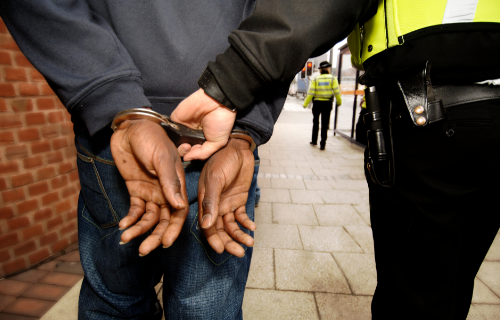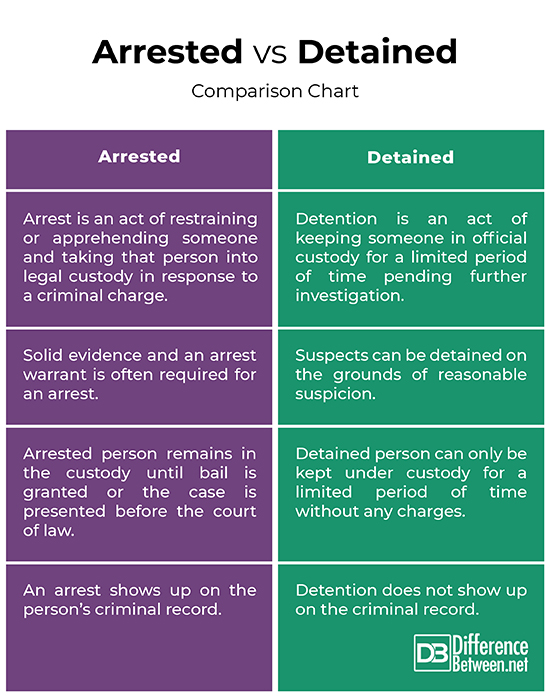Difference Between Arrested and Detained
The criminal justice system aims to maintain a balance between protecting peoples’ rights to safety and the communal interest in maintaining a crime-free society. These two goals seem conflicting, mostly when officers of the law physically take control of private citizens – that is, when they exercise their powers to detain or to arrest. People are often mistaken when they talk about arrest, and they confuse arrest with detention. There are still many people who think that being arrested is the same as being detained. But this is not the case.

What does it mean by being arrested?
Arrest is a legal term which means to restrain or apprehend someone and taking that person into custody by legal authority, particularly in response to a criminal charge against the person. When a person is being arrested, his or her maximum liberties or freedom of movement are confined by law enforcement and he or she is put into protective custody of law. It is an act of taking a person into legal custody or control on the ground of a criminal charge or suspicion.
If you’re being arrested, your criminal activities are at rest because you’re behind bars. But, an arrest warrant is generally required for an arrest, but not necessarily (on the grounds of suspicion). If a person is, let’s say, arrested, he must have committed a crime or have been suspected of a crime he may or may not have committed. Arrest is a formal, legal procedure in a criminal justice system. Sometimes, a person is arrested after the court issues a warrant of the arrest against that person. The officers of the law have the authority to arrest.

What does it mean by being detained?
Detention is a temporary measure whereby a private citizen is hold lawfully for a limited period of time for further questioning. If you’re being detained, you are put into protective custody and removed of your freedom or liberty for a brief time period. Police can detain you because of any pending criminal charges against you or to provide protection from someone. Under the law, police officials may temporarily detain a person on the grounds of reasonable suspicion that the person is either involved or about to be involved in a criminal activity.
Under the law, if a person is arrested without a warrant, they can only be kept under protective custody for no more than 72 hours. Being detained does not always mean that a person is being kept in a secret detention center, like you see in movies, either for interrogation or as a punishment against a crime. Detention is often the first step to an active investigation. The law enforcement officials can detain a person on the grounds of reasonable belief that the person is suspected of the crime or is the perpetrator.
Difference between Arrested and Detained
Meaning of Arrested and Detained
– Arrest is an act of restraining or apprehending someone and taking that person into legal custody, especially in response to a criminal charge against that person, depriving him/her of their maximum liberties, including freedom of movement. Detention is an act of keeping someone in official custody for a limited period of time for further questioning or interrogation.
Reason for Arrested and Detained
– Police arrests someone only on solid grounds that the person has allegedly committed a crime. Detention, on the other hand, is a temporary situation wherein police keeps the suspect in legal custody pending charges for further questioning or interrogation. The officials are bound to read their legal rights, and a legal counsel is then permitted for communication and assistance.
Purpose
– An arrest warrant is generally required for an arrest. A person is being arrested only if he/she has committed a serious crime and the purpose of an arrest is to bring the person before the court of law and to secure the administration of the law. It prevents them from committing a criminal offense any further. A person can be detained under possible suspicion or pending charges against the person.
Duration of Arrested and Detained
– When a person is arrested, he/she remains in the police custody until bail is granted or his/her case is presented before the court of law. The time is not fixed and depends on many factors, including the severity of the charges against him/her. On the other hand, if a person is detained, he or she is put under custody for a shorter period of time.
Arrested vs. Detained: Comparison Chart

Summary
That being said, the primary difference between being arrested and being detained lies in the fact that whether the prime accused or suspect is actually guilty of the charge or not. So, when the person is being detained, he/she remains in legal custody pending charges or further investigation. And when a person is being arrested, he/she is taken into immediate custody following charges against him/her and needs to be presented before the court of law within 24 hours. When you’re being arrested, it is a legal proof that you have committed a crime.
How to tell whether you’ve been arrested or detained?
If you’re put into legal custody or control on the ground of a criminal charge or suspicion, it means you’re being arrested. If you’ve been suspected of a crime and you are put into custody under suspicion pending charges, this means you’re being detained.
What are my rights if I am arrested or detained?
A person who is detained or arrested has the right to have the assistance of a legal counsel and he or she shall be informed of his/her legal rights.
How long can you be detained in Canada and USA without charges?
You can only be detained without any charges in Canada and USA for up to 24 hours without a warrant. After that, they have to charge you or release you.
How long can you be lawfully detained?
The maximum amount of time you can be detained lawfully is up to 72 hours. A person can only be held under protective custody without any charges for no more than 48 hours.
Do police have to tell you why you are being detained in USA or Canada?
No law enforcement official can detain you without any reason, just because you look guilty or suspicious. They have to have a reason for your detention. The police must be able to justify the detention before making an arrest.
How long can police detain you in USA or Canada?
If the police have reasonable and probable grounds to detain you and you’re put into protective custody, they will only be able to keep you for 24 hours. It can be extended if it’s a weekend or a holiday. After 24 hours, they will either have to charge you for a criminal offense or release you.
- Difference Between Caucus and Primary - June 18, 2024
- Difference Between PPO and POS - May 30, 2024
- Difference Between RFID and NFC - May 28, 2024
Search DifferenceBetween.net :
Leave a Response
References :
[0]Uma Devi, B. Arrest, Detention, and Criminal Justice System: A Study in the Context of the Constitution of India. New Delhi, India: Oxford University Press, 2012. Print
[1]Rock, F. Communicating Rights: The Language of Arrest and Detention. Berlin, Germany: Springer, 2007. Print
